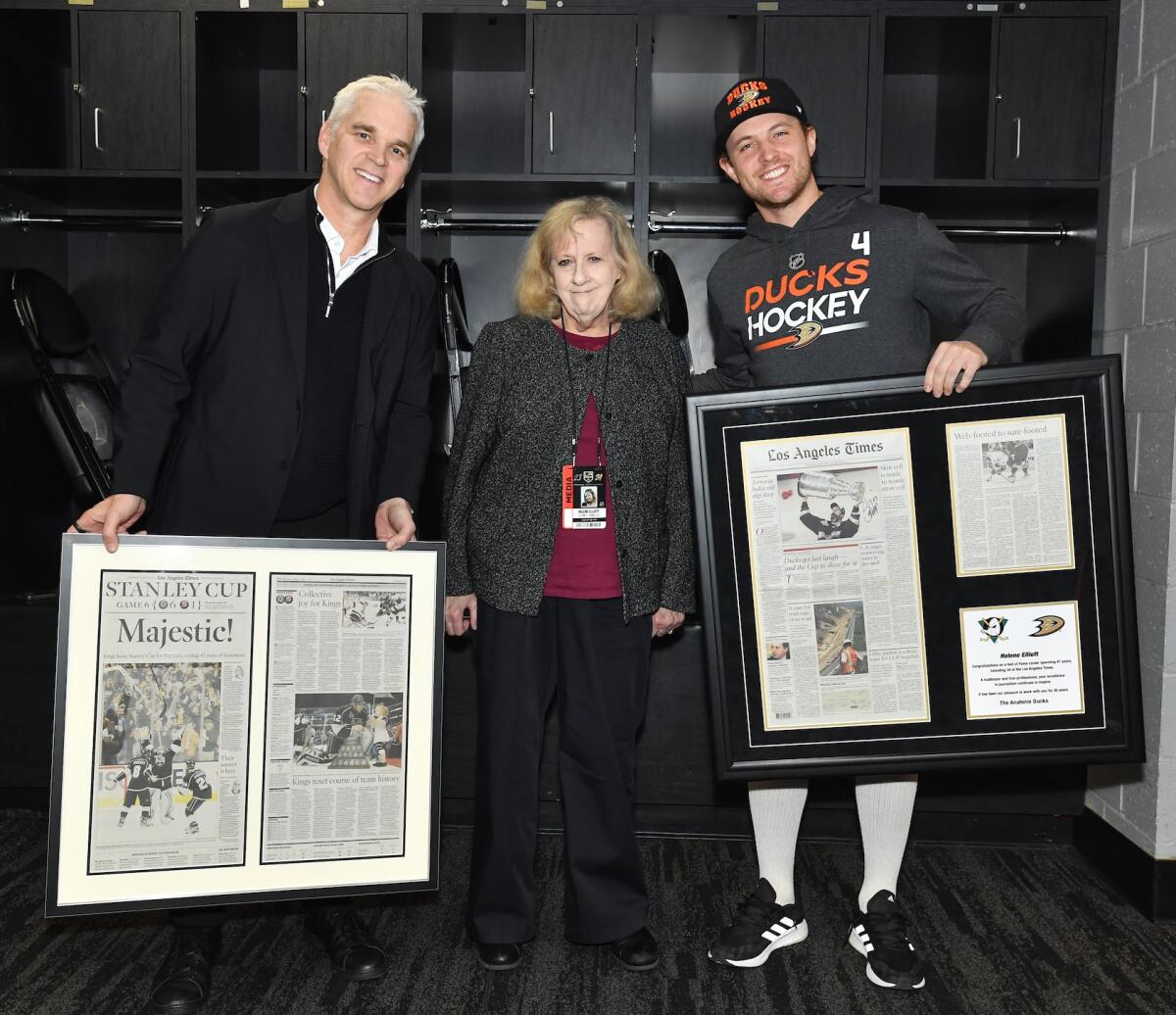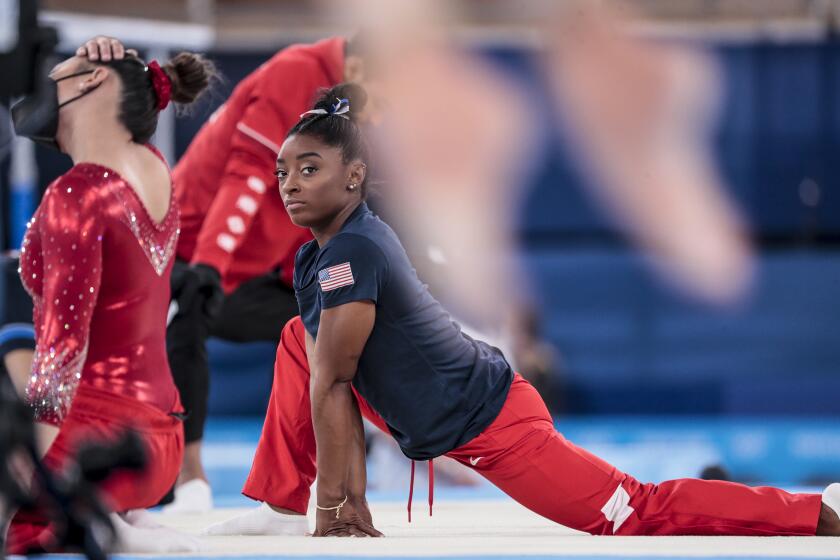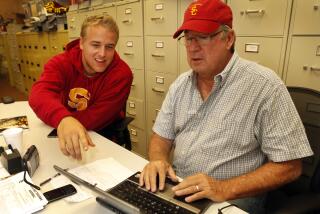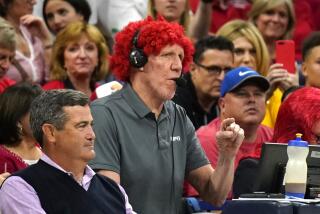Column: Thank you, readers, for helping my sportswriting dream come true

We had plans.
My husband, Dennis D’Agostino, was going to reduce his workload as the New York Knicks’ team historian and a statistician for sports teams’ TV and radio broadcasts, and I was going to cover the Paris Olympics and then bid au revoir to the Los Angeles Times. We talked about visiting Maui next summer for our 25th anniversary, with a stop at the beach where we got married. Or, as he called it, the scene of the crime.
Man plans, God laughs. And then you cry.
When my husbum (a nickname he loved) died of a heart attack in September, those plans blew up. So did my life. I threw myself into my work, hoping to be distracted from the paralyzing grief. To a degree, working helped. Colleagues and team officials were kind and compassionate. But I struggled. I had let my work define me, and for a long time, that was enough. I realized it wasn’t enough anymore.
When economic forces hit The Times hard enough for management to lay off more than 90 people and offer buyouts to others, I knew it was time for me to get off the merry-go-round, step back, and take time to heal. After 47 years as a sportswriter, the last 34-plus of those at The Times, I have taken a buyout. My last day will be Tuesday.
The decision was agonizing. But the timing was right, and I take some consolation in knowing my departure saved the job of Chargers writer Jeff Miller.
I certainly didn’t make this decision out of concern there wouldn’t be enough to write about here in the coming years.
Shohei Ohtani will be a spectacle at the center of the Dodgers’ daily saga. The Lakers are always dramatic: Does LeBron have another title run left in him, and will his career last long enough to play alongside his son Bronny? The Kings stumbled and fired their coach, but simply making the playoffs in the NHL means anything is possible — as they proved by winning the Stanley Cup as the No. 8 West seed in 2012.
USC football coach Lincoln Riley must prove he can put together a defensive plan. DeShaun Foster, hired on short notice to revive UCLA’s football program, will have a honeymoon this season but maybe not much beyond that. The Olympics will be held in Los Angeles in 2028. There are tennis players, gymnasts, figure skaters, water polo players, track and field athletes and so many others doing amazing things here every day.
And this could finally be the year the Clippers reach the NBA Finals. Miracles do happen.
In ceremony tonight, The Times sportswriter will be the first female journalist to receive the honor.
But for me, it’s time to pause and consider what’s next. This is the right moment to jump off the cliff and hope to land on a pile of soft foam blocks instead of a row of jagged rocks.
Warning: ahead lies old-person reminiscing.
When I began my career, at the Chicago Sun-Times, I often worked desk shifts, which meant editing typewritten pages of copy that were pulled off a fax machine. We’d take half-sheets of yellow paper and write out headlines, counting the assigned value of each letter to make sure the headline would fit the allotted space. We’d clip them to a kind of clothesline that took them down to the composing room. It was exciting and exhilarating to work in a highly competitive market. I crossed the Mississippi River for the first time and learned how flat parts of the Midwest are.
We got the first portable computers, which were bulky and balky. When on the road, we were obligated to call the office and provide the hotel’s phone number in case someone needed to reach us. No cellphones then, kids.
One of my duties on a desk shift was to answer the phone. I’d pick up a call and after a pause, the person at the other end would often ask to speak to “somebody who knows something.” Obviously, no woman could know anything. After one of my first feature stories appeared in the newspaper, a colleague approached me and told me, “That was so good I couldn’t even tell it was written by a woman.” He meant it as praise. I can remember applying for another job and being told, “We already have a female sportswriter.” Left unspoken was the notion they couldn’t possibly have had two women on staff.
There were few female sportswriters or sportscasters working at that time, a few of them in Chicago. The first time I covered an event at Wrigley Field, I discovered the only facility on the press level was a urinal.
Slowly, and with the help of the legal system, barriers fell. We were granted equal access. I didn’t have to stand outside locker rooms anymore and wait for not-always-cooperative team public relations officials to bring athletes out to talk to me. I didn’t have to hear a baseball player refuse to speak to all reporters because a female reporter was in the locker room, the player’s way of trying to set male and female reporters against one another. It became normal to see many female reporters and broadcasters at events. We were visible and we were excelling at important jobs. We still do.
A couple of years ago, while at a Lakers game, I mentioned to the young writer next to me that I was happy to see so many female journalists in the room because there were so few of us when I began in the profession and we often were barred from press boxes and locker rooms. He turned to me, his face bearing a textbook expression of confusion.
“There was a time when female reporters weren’t allowed in locker rooms?” he said.
I was glad he considered working alongside female reporters an ordinary part of his job, and equally happy that the generations after mine didn’t have to deal with the nonsense we faced. But I was sad that our history isn’t remembered and honored. My thanks to the female sportswriters who came before me, led by Lawrie Mifflin, Mary Flannery, Melissa Ludtke, Michele Himmelberg, Lesley Visser, Tracy Dodds and Jane Gross.
End of old-person reminiscences.
Simone Biles, Naomi Osaka and other high-profile athletes pushed mental health issues to the forefront of conversations in sports and beyond in 2021.
Covering sports has allowed me to see more of the world than a kid from a remote corner of Brooklyn ever dreamed was possible. I’ve seen athletes at their best, and at their worst. I’ve written stories or columns from 18 Olympics, a couple of Super Bowls, a few NBA Finals, several World Series, a few U.S. Open tennis tournaments, men’s and women’s soccer World Cup tournaments, and more Stanley Cup Finals than I can count. When someone asked me which was my favorite sport or event, I’d always say it was whatever I was covering at that moment. And that was the truth.
I wish all the best to the many talented people at The Times. The instinctive human need to tell stories lives on, as does the desire to hear or see those tales and pass them along. I hope The Times finds a successful and sustainable formula to continue telling those stories.
To those who have taken the time to read me over the years, my infinite gratitude. You’ve sometimes agreed with me, sometimes disagreed, but I always appreciated that you care. Many of you shared your fandom stories, vented your anger when things went wrong or celebrated when your team won. Thank you for letting me occupy a small space in your life. I’ll miss those email conversations. I never wanted to be anything but a sportswriter, since the day I saw an article I’d written appear in my junior high school newspaper. I was lucky to have that dream come true.
My husbum’s shoes are still where he left them, by our front door. Our laundry basket, filled with his clean T-shirts, remains on the floor in his office, where he left it that day. Moving the shoes and the basket will be my first project. After that, anything should be easy to face.
In the olden days, writers were taught to put the mark –30– at the bottom of a story to indicate the end. I’ll do that once more, to honor a great tradition and in hopes there’s a better future for journalism and for us all.
–30–
More to Read
Go beyond the scoreboard
Get the latest on L.A.'s teams in the daily Sports Report newsletter.
You may occasionally receive promotional content from the Los Angeles Times.












